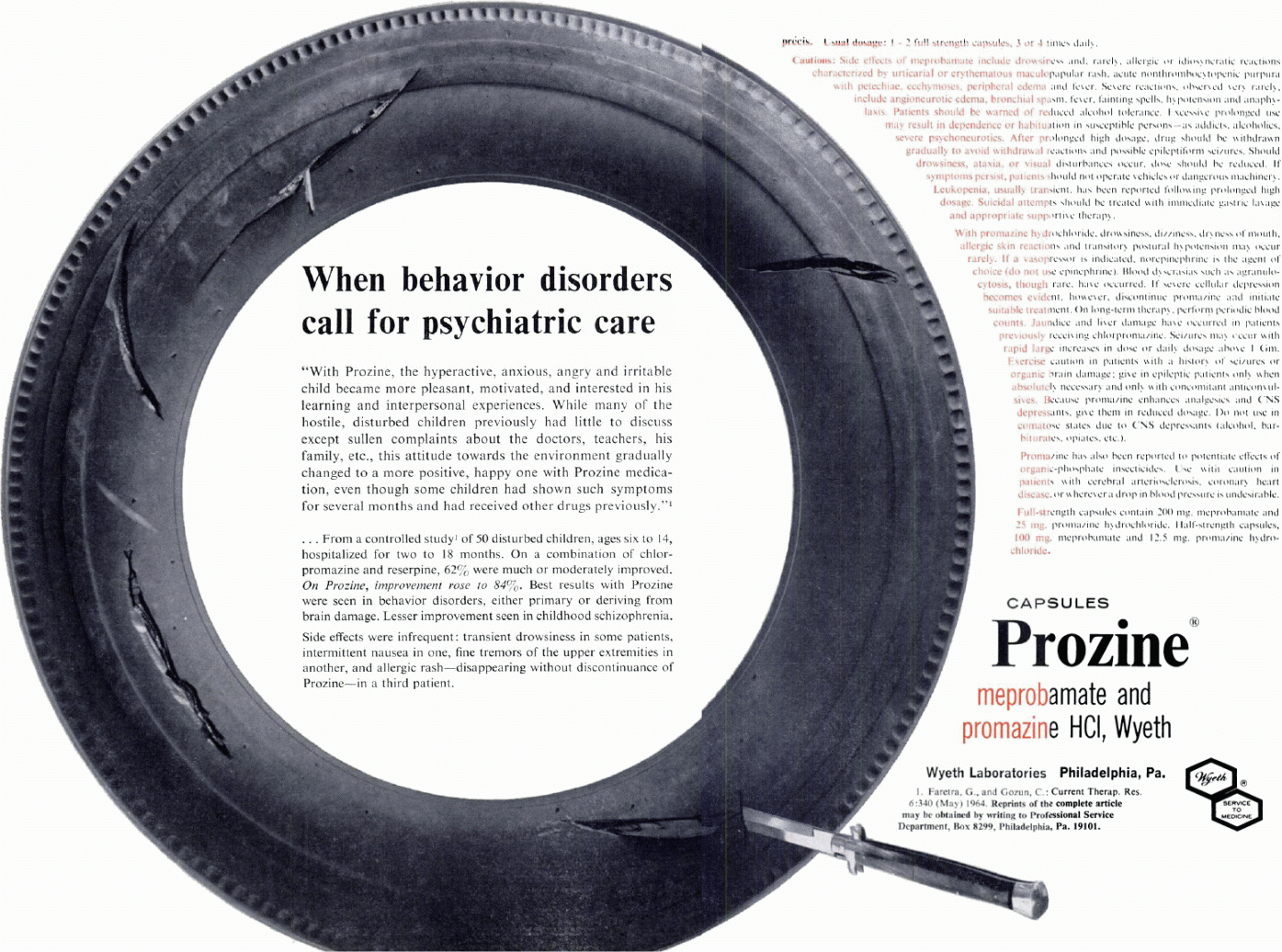
|
Prozine advertisement, 1965. Mental Hospitals, Vol. 16, No. 4. When behavior disorders call for psychiatric care "With Prozine, the hyperactive, anxious, angry and irritable child became more pleasant, motivated, and interested in his learning and interpersonal experiences. While many of the hostile, disturbed children previously had little to discuss except sullen complaints about the doctors, teachers, his family, etc., this attittude towards the environment gradually changed to a more positive, happy one with Prozine medication, even though some children had shown such symptoms for several months and had received other drugs previously."(1) ...From a controlled study(1) of 50 disturbed children, ages six to 14, hospitalized for two to 18 months. On a combination of chlorpromazine and reserpine, 62% were much or moderately improved. On Prozine, improvement rose to 84%. Best results with Prozine were seen in behavior disorders, either primary or deriving from brain damage. Lesser improvement seen in childhood schizophrenia. Side effects were infrequent: transient drowsiness in some patients, intermittent nausea in one, fine tremors of the upper extremitites in another, and allergic rash -- disappearing without discontinuance of Prozine -- in a third patient. précis. Usual dosage: 1 - 2 full strength capsules, 3 or 4 times daily. Cautions: Side effects of meprobamate include drowsiness and, rarely, allergic or idiosyncratic reactions characterized by urticarial or erythematous maculopapular rash, acute nonthrombocytopenic purpura with petechiae, ecchymoses, peripheral edema and fever. Severe reactions, observed very rarely, include angioneurotic edema, bronchial spasm, fever, fainting spells, hypotension and anaphylaxis. Patients should be warned of reduced alcohol tolerance. Excessive prolonged use may result in dependence or habituation in susceptible persons -- as addicts, alcoholics, severe psychoneurotics. After prolonged high dosage, drug should be withdrawn gradually to avoid withdrawal reactions and possible epileptiform seizures. Should drowsiness, ataxia, or visual disturbances occur, dose should be reduced. If symptoms persist, patients should not operate vehicles or dangerous machinery. Leukopenia, usually transient, has been reported following prolonged high dosage. Suicidal attempts should be treated with immediate gastric lavage and appropriate supportive therapy. With promazine hydrochloride, drowsiness, dizziness, dryness of mouth, allergic skin reactions and transitory postural hypotension may occur rarely. If a vasopressor is indicated, norepinephrine is the agent of choice (do not use epinephrine). Blood dyscrasias such as agranulocytosis, though rare, have occurred. If severe cellular depression becomes evident, however, discontinue promazine and initiate suitable treatment. On long-term therapy, perform periodic blood counts. Jaundice and liver damage have occurred in patients previously receiving chlorpromazine. Seizures may occur with rapid large increases in dose or daily dosage above 1 Gm. Exercise caution in patients with a history of seizures or organic brain damage; give in epileptic patients only when absolutely necessary and only with concomitant anticonvulsives. Because promazine enhances analgesics and CNS depressants, give them in reduced dosage. Do not use in comatose states due to CNS depressants (alcohol, barbiturates, opiates, etc.). Promazine has also been reported to potentiate effects of organic-phosphate insecticides. Use with caution in patients with cerebral arteriosclerosis, coronary heart disease, or wherever a drop in blood pressure is undesirable. Full-strength capsules contain 200 mg. meprobamate and 25 mg. promazine hydrochloride. Half-strength capsules, 100 mg. meprobamate and 12.5 mg. promazine hydrochloride. 1. Faretra, G., and Gozun, C.: Current Therap. Res. 6:340 (May ) 1964. Reprints of the complete article may be obtained by writing to Professional Service Department, Box 8299, Philadelphia, Pa. 19101. PROZINE® meprobamate and promazine HCl, Wyeth Wyeth Laboratories Philadelphia 1, Pa. WYETH ~ SERVICE TO MEDICINE |